
Yucca is a genus of perennial shrubs and trees in the family Asparagaceae, subfamily Agavoideae. Its 40–50 species are notable for their rosettes of evergreen, tough, sword-shaped leaves and large terminal panicles of white or whitish flowers. They are native to the Americas and the Caribbean in a wide range of habitats, from humid rainforest and wet subtropical ecosystems to the hot and dry (arid) deserts and savanna.

Yucca brevifolia is a plant species belonging to the genus Yucca. It is tree-like in habit, which is reflected in its common names.
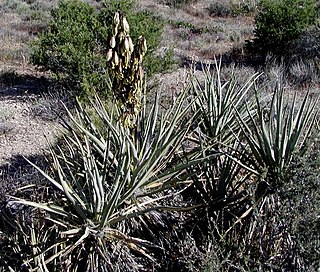
Yucca baccata is a common species of yucca native to the deserts of the southwestern United States and northwestern Mexico, from southeastern California north to Utah, east to western Texas and south to Sonora and Chihuahua. It is also reported in the wild in Colombia.

Yucca elata is a perennial plant, with common names that include soaptree, soaptree yucca, soapweed, and palmella. It is native to southwestern North America, in the Sonoran Desert and Chihuahuan Desert in the United States, southern Nevada, southwestern Utah, and northern Mexico. Yucca elata is widely distributed, although its population appears to be decreasing.

Yucca filamentosa, Adam's needle and thread, is a species of flowering plant in the family Asparagaceae native to the southeastern United States. Growing to 3 metres tall, it is an evergreen shrub valued in horticulture.

Agave attenuata, commonly called the foxtail or lion's tailagave or the swan's neck agave, is a species of flowering plant in the family Asparagaceae. Sometimes called the soft-leaf or soft-leaved agave, the aforementioned animal-related names are a nod to the appearance of the plant's inflorescence, which—after years, generally—rises slightly before gravity brings it back down, giving the bloom a curved, "swan"-like or "foxtail" look. The species' specific manner of flowering is unique in the genus Agave as most other species produce a towering, vertical display, reminiscent of a miniature tree.

Carpinus caroliniana, the American hornbeam, is a small hardwood understory tree in the genus Carpinus. American hornbeam is also known as blue-beech, ironwood, musclewood and muscle beech. It is native to eastern North America, from Minnesota and southern Ontario east to Maine, and south to eastern Texas and northern Florida. It also grows in Canada. It occurs naturally in shaded areas with moist soil, particularly near the banks of streams or rivers, and is often a natural constituent understory species of the riverine and maritime forests of eastern temperate North America.

Corymbia maculata, commonly known as spotted gum, is a species of medium-sized to tall tree that is endemic to eastern Australia. It has smooth, mottled bark, lance-shaped to curved adult leaves, flower buds usually in groups of three, white flowers and urn-shaped or barrel-shaped fruit.

Roscheria is an endangered, monotypic genus of flowering plant in the palm family. The genus is named for Albrecht Roscher, a 19th-century German explorer, and the epithet for its single species R. melanochaetes derives from Latin and Greek meaning 'black' and 'bristle', alluding to the spines covering the trunks. They naturally occur on the Mahé and Silhouette Islands of Seychelles where they grow in mountainous rainforest and are threatened by habitat loss.

Yucca rostrata also called beaked yucca, is a tree-like plant belonging to the genus Yucca. The species is native to Texas, and the Chihuahua and Coahuila regions of Mexico. This species of Yucca occurs in areas that are arid with little annual rainfall, normally Bw climates (desert) and Bs climates.

Yucca gigantea is a species of flowering plant in the asparagus family, native to Mexico and Central America. Growing up to 8–12 m (26–39 ft) in height, it is an evergreen shrub which is widely cultivated as an ornamental garden or house plant, often referred to simply as yucca cane. The edible flower is the national flower of El Salvador locally called izote, and it is used extensively in Salvadoran cuisine.
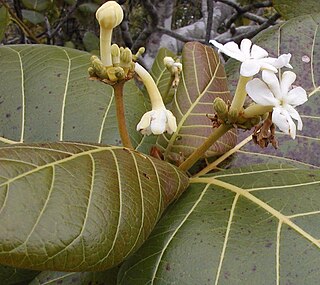
Guettarda speciosa, with common names sea randa, or zebra wood, is a species of shrub in the family Rubiaceae found in coastal habitats in tropical areas around the Pacific Ocean, including the coastline of central and northern Queensland and Northern Territory in Australia, and Pacific Islands, including Micronesia, French Polynesia and Fiji, Malaysia and Indonesia, Maldives and the east coast of Africa. It reaches 6 m in height, has fragrant white flowers, and large green prominently-veined leaves. It grows in sand above the high tide mark.

Yucca glauca is a species of perennial evergreen plant, adapted to xeric (dry) growth conditions. It is also known as small soapweed, soapweed yucca, Spanish bayonet, and Great Plains yucca.
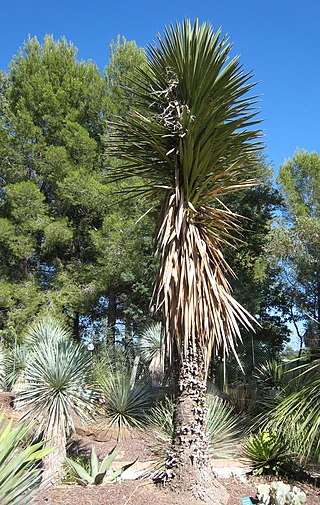
Yucca filifera is a member of the subfamily Agavaceae, family Asparagaceae, native to central Mexico.

Yucca jaliscensis is a Yucca species native to the highlands of southwestern Mexico. Common names for this species include Jalisco Yucca, Jalisco Soapwort, Izote Yucca. It is native to mountainous areas at about 5000 feet in the States of Jalisco, Colima and Guanajuato.

Yucca flaccida, commonly called Adam's needle or weak-leaf yucca, is a species of flowering plant in the asparagus family (Asparagaceae). It is native to south-central and southeastern North America, from the lower Great Plains eastward to the Atlantic seaboard in Virginia, south through Florida and the Gulf states. Its natural habitat is in sandy open woodlands and fields. It is not considered to be threatened by the IUCN.
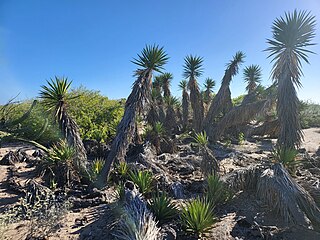
Yucca valida is a plant species in the family Asparagaceae, native to the Mexican states of Baja California, Baja California Sur, Sonora, and Sinaloa. The common name is datilillo.

Yucca thompsoniana, the Thompson's yucca, is a plant in the family Asparagaceae, native to Texas, Chihuahua and Coahuila. Other names for the plant include Beaked yucca, Soyate and Palmita.
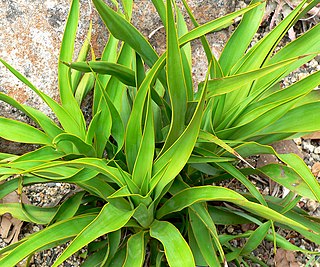
Yucca rupicola is a plant in the family Asparagaceae, known as the twistleaf yucca, twisted-leaf yucca, Texas yucca or twisted-leaf Spanish-dagger. The species was described by George Heinrich Adolf Scheele in 1850. This is a small, acaulescent plant with distinctive twisted leaves. It is native to the Edwards Plateau region of Texas and also to northeastern Mexico.

Yucca aloifolia is the type species for the genus Yucca. Common names include aloe yucca, dagger plant, and Spanish bayonet. It grows in sandy soils, especially on sand dunes along the coast.





















